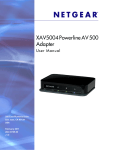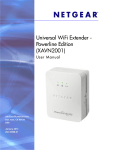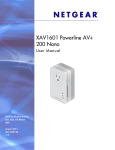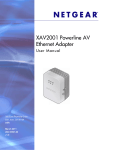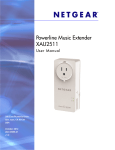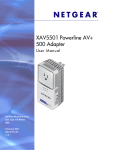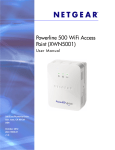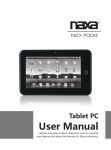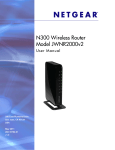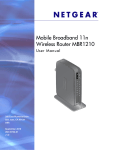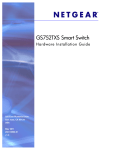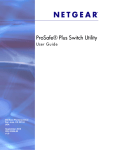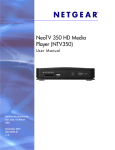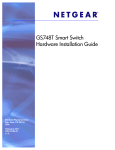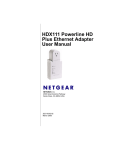Download XAV101v2 Powerline AV 200 Adapter User Manual
Transcript
XAV101v2 Powerline AV 200 Adapter User M anua l 350 East Plumeria Drive San Jose, CA 95134 USA December 2010 202-10808-01 v1.0 XAV101v2 Powerline AV 200 Adapter User Manual ©2010 NETGEAR, Inc. All rights reserved. No part of this publication may be reproduced, transmitted, transcribed, stored in a retrieval system, or translated into any language in any form or by any means without the written permission of NETGEAR, Inc. Technical Support Thank you for choosing NETGEAR. To register your product, get the latest product updates, or get support online, visit us at http://support.netgear.com. Phone (US & Canada only): 1-888-NETGEAR Phone (Other Countries): See Support information card. Trademarks NETGEAR, the NETGEAR logo, ReadyNAS, ProSafe, Smart Wizard, Auto Uplink, X-RAID2, and NeoTV are trademarks or registered trademarks of NETGEAR, Inc. Microsoft, Windows, Windows NT, and Vista are registered trademarks of Microsoft Corporation. Other brand and product names are registered trademarks or trademarks of their respective holders. Statement of Conditions To improve internal design, operational function, and/or reliability, NETGEAR reserves the right to make changes to the products described in this document without notice. NETGEAR does not assume any liability that may occur due to the use, or application of, the product(s) or circuit layout(s) described herein. Revision History Publication Part Number Version Publish Date Comments 202-10808-01 v1.0 December 2010 First publication 2 | Contents Chapter 1 Installation and Basic Configuration How the Powerline Adapter Fits in Your Network. . . . . . . . . . . . . . . . . . . . . 5 Powerline AV 200 Adapter Features . . . . . . . . . . . . . . . . . . . . . . . . . . . . . . 6 XAV101v2 Label. . . . . . . . . . . . . . . . . . . . . . . . . . . . . . . . . . . . . . . . . . . . 6 LED and Feature Descriptions . . . . . . . . . . . . . . . . . . . . . . . . . . . . . . . . . 7 Installing Your Powerline AV Ethernet Adapter . . . . . . . . . . . . . . . . . . . . . . 8 Prepare for installation:. . . . . . . . . . . . . . . . . . . . . . . . . . . . . . . . . . . . . . . 8 Connecting a Powerline AV Ethernet Adapter to the Router . . . . . . . . . . . . 9 Connect other Ethernet Powerline Adapters . . . . . . . . . . . . . . . . . . . . . . . 10 Understanding Powerline Network Security . . . . . . . . . . . . . . . . . . . . . . . . 11 Changing the Default Encryption . . . . . . . . . . . . . . . . . . . . . . . . . . . . . . . . 12 Chapter 2 Using the XAV101v2 Powerline Utility Installing the XAV101v2 Powerline Utility. . . . . . . . . . . . . . . . . . . . . . . . . . 13 Device Settings Tab . . . . . . . . . . . . . . . . . . . . . . . . . . . . . . . . . . . . . . . . . . 15 Adding a Device to a Powerline Network . . . . . . . . . . . . . . . . . . . . . . . . 16 Security . . . . . . . . . . . . . . . . . . . . . . . . . . . . . . . . . . . . . . . . . . . . . . . . . . . 18 Changing the Network Encryption Key. . . . . . . . . . . . . . . . . . . . . . . . . . 18 Setting Up a Custom Network Encryption Key . . . . . . . . . . . . . . . . . . . . 19 Returning to the Default Network Encryption Key . . . . . . . . . . . . . . . . . 19 Quality of Service (QoS). . . . . . . . . . . . . . . . . . . . . . . . . . . . . . . . . . . . . . . 21 To set the priority of data transfers by the type of protocol: . . . . . . . . . . . . 22 Diagnostics . . . . . . . . . . . . . . . . . . . . . . . . . . . . . . . . . . . . . . . . . . . . . . . . . 23 Factory Reset . . . . . . . . . . . . . . . . . . . . . . . . . . . . . . . . . . . . . . . . . . . . . . . 24 Chapter 3 Troubleshooting Product Registration, Support, and Documentation . . . . . . . . . . . . . . . . . . 26 Basic Functioning . . . . . . . . . . . . . . . . . . . . . . . . . . . . . . . . . . . . . . . . . . . . 26 Troubleshooting Tips . . . . . . . . . . . . . . . . . . . . . . . . . . . . . . . . . . . . . . . . . 27 Problems After Changing Network Encryption Key . . . . . . . . . . . . . . . . . . 28 Changing the Network Encryption Key for 1 Unit at a Time . . . . . . . . . . 28 Appendix A Factory Default Settings and Technical Specifications Default Configuration Settings . . . . . . . . . . . . . . . . . . . . . . . . . . . . . . . . . . 30 Technical Specifications . . . . . . . . . . . . . . . . . . . . . . . . . . . . . . . . . . . . . . . 30 Appendix B Notification of Compliance Contents | 3 1. Installation and Basic Configuration 1 This chapter describes how to install and configure the XAV101v2 Powerline AV 200 Adapter. It also explains the security features and how to customize the encryption key for added security How the Powerline Adapter Fits in Your Network You can use the Powerline AV 200 Adapter to implement or extend an Ethernet local area network (LAN) anywhere in your house using your existing electrical power line in place of a dedicated LAN wiring infrastructure. An example is illustrated in the following diagram for a minimal network consisting of two Powerline devices: Figure 1. Follow the instructions in the following sections to set up your Powerline adapter. Chapter 1. Installation and Basic Configuration | 5 XAV101v2 Powerline AV 200 Adapter User Manual Powerline AV 200 Adapter Features The following illustration (Figure 2, XAV101v2 Powerline AV 200 Adapter) shows the front and side panels of the Powerline AV 200 Adapter: LEDs Security/Power button Factory Reset button Ethernet port Figure 2. XAV101v2 Powerline AV 200 Adapter XAV101v2 Label The label on the rear panel of the XAV101v2 contains the following items: • Model number • MAC address • Device password • Serial number 6 | Chapter 1. Installation and Basic Configuration XAV101v2 Powerline AV 200 Adapter User Manual LED and Feature Descriptions The following table describes the status LEDs, buttons, and Ethernet port on the XAV101v2 Powerline AV Ethernet Adapter. Table 1. XAV101v2 Feature Descriptions Item Description Power LED • Solid green. The electrical power is on. • Blinking green.The adapter is in the process of restarting or setting up security. • Amber. Power saving mode. To enter power saving mode, press and hold the Power button for 5–10 seconds. • Off. There is no electrical power, or power has been turned off through the Powerline Utility. Powerline LED • Solid. The adapter is connected to a Powerline network. • Blinking. The adapter is sending or receiving data. • Off. The adapter has not found any other compatible Powerline devices using the same encryption key, or has been turned off through the Powerline utility. Use the Pick A Plug feature to pick the electrical outlet with the strongest link rate, indicated by the color displayed by the LED: Amber: Link rate >50, <80 Mbps Red: Link rate < 50 Mbps Green: Link rate > 80 Mbps (Best) – Good for HD video (Better) – Good for SD video (Good) – Good for data Ethernet LED Factory Reset button • Solid. The Ethernet port is linked, but there is no activity. • Blinking. There is traffic on the Ethernet port. • Off. There is no Ethernet connection. Press the Factory Reset button for 1 second, then release to return the Powerline adapter to its factory default settings. Security/Power The Security/Power button serves a dual function: button • Set the power mode. The Powerline Adapter’s normal state is POWER ON mode. When you first plug it into an electrical outlet, it will be in POWER ON mode. To go to POWER OFF (power saving) mode, press and hold the button for 5–10 seconds. Pressing the button again for less than 2 seconds returns it to POWER ON. You can also unplug and plug in the adapter to restore it to POWER ON. • Set security. If you set security on your other adapters, after you plug your new AV adapter into the wall socket, press its Security button for 2 seconds; then press the Security button on any adapter in your existing network for 2 seconds. Both buttons must be pressed within 2 minutes. Note: The Security button does not work in power saving mode. Ethernet port Plug one end of the Ethernet cable that comes with the XAV101v2 Powerline AV 200 Adapter into this port and the other end either into your router, or into the computer or other peripheral devices. Chapter 1. Installation and Basic Configuration | 7 XAV101v2 Powerline AV 200 Adapter User Manual Installing Your Powerline AV Ethernet Adapter Preparing for installation 1. Before you begin, verify the following: • Your Ethernet network is set up. • An Ethernet port is available on your router. • Your Internet connection is working. • An Ethernet port is available on each computer that will use a Powerline AV 200 Adapter and is configured to work on your network. Usually, the default configuration settings (TCP/IP and DHCP) are fine. 2. Familiarize yourself with the Powerline AV 200 Adapter. The front panel has three LEDs: Power, Powerline, and Ethernet. The side panel has a Security/Power button, and a Factory Reset button. The Ethernet port is located on the bottom of the adapter. See Figure 2 on page 6. 3. Plan the location of your Powerline devices: • Use an electrical outlet that is not controlled by a wall switch to avoid someone unknowingly turning off the power to the outlet. • Do not connect the Powerline AV 200 Adapter to a power strip, extension cord, or surge protector as this might prevent it from working correctly, or reduce the network performance. • Avoid plugging the Powerline AV 200 Adapter into an electrical outlet that is located near an appliance that uses a lot of power, such as a washer or dryer, or a refrigerator. This could potentially prevent the adapter from working correctly, or reduce network performance. 8 | Chapter 1. Installation and Basic Configuration XAV101v2 Powerline AV 200 Adapter User Manual Connecting a Powerline AV Ethernet Adapter to the Router 1. Plug a Powerline AV 200 Adapter into a power outlet near your router. Use the supplied gray Ethernet cable to connect from the adapter to a LAN port on your router so that the Powerline network can gain access to the Internet. The Power and Ethernet LEDs on the Powerline AV 200 Adapter should turn on. Note: It is not necessary to disconnect your router from your computer. Figure 3. 2. Once the adapter is plugged in and power is first applied, check to see that the Power LED is on. 3. After approximately 10 seconds, check to see that: a. The Power LED is solid green. b. The Powerline LED is lit. c. The Ethernet LED is on or blinks. Chapter 1. Installation and Basic Configuration | 9 XAV101v2 Powerline AV 200 Adapter User Manual Connect Other Ethernet Powerline Adapters Once the first adapter is installed and connected to your router, you can easily add adapters into your network. Adding other adapters 1. Be sure the first adapter is connected to your router. 2. Plug additional Powerline AV 200 Adapters into power outlets near the other computers and additional peripheral devices to be included in your Powerline network. 3. Use the gray Ethernet cable from the XAV101v2 package to connect from the Powerline AV 200 Adapter to an Ethernet port located on the other computer or peripheral device. 4. Wait for each Powerline adapter to be recognized by the Powerline network. The Power, Ethernet, and Powerline LEDs should turn on. This could take as little as 5 seconds, or up to 80 seconds. For details about how the LEDs work, see Table 1 on page 7. 5. Test to make sure that each computer connected to a Powerline AV 200 Adapter can access the Powerline network. For example, be sure that you can access the Internet from a remote computer. If there is a problem, see Connecting a Powerline AV Ethernet Adapter to the Router on page 9. One way to test this is to install the Powerline Utility and use it to view all the computers connected by the Powerline AV Ethernet adapter. WARNING! NETGEAR recommends that you secure your Powerline network from unauthorized access. This is especially relevant in settings such as apartment buildings. See Understanding Powerline Network Security on page 11. 10 | Chapter 1. Installation and Basic Configuration XAV101v2 Powerline AV 200 Adapter User Manual Understanding Powerline Network Security A Powerline network consists of two or more Powerline adapters using the same network encryption key. Securing your network is crucial. By encrypting the information you send over the Powerline AV 200 Adapter, you help to keep it secure from hackers. If you do not set up security on your network, anyone nearby with a Powerline network can potentially use his or her connection to gain access to your network and information you send over the Internet. This is especially relevant in settings such as apartment buildings, office buildings, dorm rooms, and other more populated areas. Powerline devices connected to the same network must use an identical encryption key. The security used by Powerline AV 200 Adapters is similar to the SSID and encryption keys used in wireless networks, but you do not need software to configure Powerline AV 200 Adapters. There are two ways to secure your Powerline network. • Press the Security button located on your Powerline AV 200 Adapter to automatically generate a random encryption key. See Changing the Default Encryption on page 12. • Use the Powerline Utility to configure your Powerline network with an encryption key that you specify. If you are already using Powerline or HomePlug devices, then you will need to use the Powerline Utility. For more information, see Chapter 2, Using the XAV101v2 Powerline Utility. For information about using the Powerline Utility to configure Powerline security or to prioritize Powerline network traffic using the Quality of Service (QoS) feature, see Chapter 2. Note: For information about how to return the XAV101v2 Powerline AV 200 Adapter to its factory default settings, see Resetting to Factory Defaults on page 28. Chapter 1. Installation and Basic Configuration | 11 XAV101v2 Powerline AV 200 Adapter User Manual Changing the Default Encryption You can use the Security button to change the default encryption key and set a private encryption key instead. The default encryption key is HomePlugAV. To set a private encryption key: 1. Verify that all the Powerline AV 200 Adapters to be configured are plugged in. WARNING! Do not press the Security button on the Powerline adapter until installation is complete and all adapters on your network are plugged in and communicating with each other. Pressing the Security button too soon can temporarily disable Powerline communication. If this should occur, reset the Powerline adapter to its factory default settings. See Resetting to Factory Defaults on page 28. 2. On the first Powerline AV 200 Adapter, press its Security button for 2 seconds. The power LED starts blinking after you release the button. The adapter automatically produces a new, randomly generated network encryption key that each Powerline AV 200 Adapter will use. At this point, the other adapters in your network cannot communicate with each other. 3. Within 2 minutes of pressing the Security button on the first adapter, press the Security button on the second adapter for 2 seconds. In order to pair the devices, you must press both buttons within 2 minutes. This securely configures your Powerline network with the same network encryption key. 4. If your network has more than 2 adapters, press the Security button on the additional adapter for 2 seconds, then press the Security button on any additional adapters in your existing network for 2 seconds. Both buttons must be pressed within 2 minutes. The adapters retain security settings even if they are unplugged. Note: An adapter can generate a private key only once. To replace a private key, first reset the adapter back to its factory defaults (see Resetting to Factory Defaults on page 28), then follow the steps in this section. 12 | Chapter 1. Installation and Basic Configuration 2. Using the XAV101v2 Powerline Utility 2 This chapter explains how to install and use the Powerline Utility. The XAV101v2 Powerline Utility is compatible other XAV101v2 adapters and with the XAV1501 Powerline adapter. You can use the NETGEAR Powerline Utility to: • configure encryption for your Powerline network • perform diagnostics and monitor performance • set quality of service (QoS) features to prioritize Powerline network traffic • reset adapters to factory default settings Installing the XAV101v2 Powerline Utility This utility provides you with the option of setting your own unique encryption Powerline network encryption key, and prioritizing traffic passing through the Powerline network. To install the XAV101v2 Powerline Utility: 1. Go the NETGEAR home page at http://www.netgear.com 2. Select the Home tab. 3. Select Products and Powerline and Coax from the Home tab drop-down menus. 4. Select Simple Connections. 5. Click XAV101v2. 6. Click XAV101v2 Product Support. 7. Click the Downloads tab. 8. Select Powerline Universal Utility Version S1.5.0.10 or later. 9. On the XAV101v2 Powerline Utility Version S1.5.0.10 screen, right-click the Right-click and Save to Download button. Chapter 2. Using the XAV101v2 Powerline Utility | 13 XAV101v2 Powerline AV 200 Adapter User Manual 10. On the pop-up menu, select Save Target As, and save the Powerline utility to the directory of your choice. 11. There are three ways to start the XAV101v2 Powerline Utility: • Click the Run button when prompted. • Click the XAV101v2 Powerline Utility shortcut icon located on your desktop. • Select Start > Programs > NETGEAR > NETGEAR Powerline Utility. 14 | Chapter 2. Using the XAV101v2 Powerline Utility XAV101v2 Powerline AV 200 Adapter User Manual Device Settings Tab When launched, the Powerline Utility opens to the Device Settings tab. If all devices are not shown, click the Refresh button to detect all Powerline Adapters on your network. Figure 1. Note: You might see a message at the bottom of the screen regarding the power saving feature. If the unit goes into power saving mode, the Powerline Utility will not find it. Keeping a connected Ethernet cable plugged into the device will keep it active. By clicking the light in the LED Status column, you can toggle the LED between on and off. Chapter 2. Using the XAV101v2 Powerline Utility | 15 XAV101v2 Powerline AV 200 Adapter User Manual The following table describes the features on the Device Settings tab. Table 1. Powerline Utility Device Settings Tab Field or Button Description Device Names This lists the Powerline devices detected on the network after the utility completes a scan for devices. The device name is initially set by the utility, but can be changed to reflect your specific adapter. For example, “Office” or “Master Bedroom.” Model This identifies the model number of the Powerline Adapter. MAC Address The MAC address for the Powerline device. This is also on the product label, which might not be visible when the device is plugged in. Quality (Mbps) This indicates the type of traffic that can be handled smoothly and the link rate for each Powerline device: HD Video, SD/DVD Video, or Data. • HD Video. The device can handle high-definition video traffic smoothly. This status is shown if the transmit and receive link speed is greater than 80 Mbps. • SD/DVD Video. The transmit and receive link speed is greater than 50 Mbps or less than 80 Mbps. • Data. The device cannot handle video data smoothly. This status is shown if the transmit or receive link speed is less than 50 Mbps. LED Status Enable or disable the LEDs for a Powerline device.The LEDs are enabled by default. Adding a Device to a Powerline Network If you are adding a device to a Powerline network, and the network encryption key has been left at its default setting, all you need to do is plug the new device into a power outlet. If the network encryption key has been customized, there are two ways to set the security: • You can use the Security button to add the new device to your network. See Adding Adapters to Your Network on page 11. • You can use the Model Number Powerline Utility to add the new device to the network, as described in later sections. The procedure for setting the network encryption key depends on whether the computer running the Model Number Powerline Utility is connected directly to the new Powerline adapter (local) or is connected to a different device in the Powerline network (remote). Adding a device from a locally-connected computer 1. Plug the new Powerline adapter into an available AC power outlet. 2. Connect the Ethernet cable that came with the adapter to the adapter’s Ethernet port and an Ethernet port on the computer. 3. Start the Powerline Utility (see step 11 on page 14 for three different ways to do this.) The first screen to appear is the Device Settings tab. Wait for the utility to detect the new device. 4. Select the Advanced tab, and click the Security arrow. 16 | Chapter 2. Using the XAV101v2 Powerline Utility XAV101v2 Powerline AV 200 Adapter User Manual 5. From the Device Name column select the device. 6. Type the network encryption key into the Create a New Encryption Key field. 7. Click the Apply Security to Selected Devices button. 8. Select the Device Settings tab to perform a scan. Verify that the devices in the Powerline network appear in the device list. It might take a minute or two for all devices in the network to be detected. Adding a device from a remotely-connected computer If you are using a custom network encryption key, set all the devices to the default network encryption key of HomePlugAV so that they can communicate with each other. Then set all the devices to the network encryption key that you want to use. 1. To change the encryption key for a remote device, you must enter the password for the device. The password is printed on the product label. 2. Click the device name for a remote Powerline device to highlight it in blue. Note: Be sure to change the password of remote devices before changing it on the local device so that you can maintain connectivity throughout this process. 3. Click Enter Password. 4. Enter the device password, and then click OK. The device password is located on the product label. 5. From the Device Name column, select the device. 6. In the Apply the Encryption Key field, type the network encryption key. 7. Click the Apply Security to Selected Devices button. 8. Select the Device Settings tab. This will perform an automatic scan. Verify that the devices in the Powerline network appear in the device list. It might take a minute or two for all devices in the network to be detected. Chapter 2. Using the XAV101v2 Powerline Utility | 17 XAV101v2 Powerline AV 200 Adapter User Manual Security From the Advanced Settings tab on the Powerline Utility you can perform a number of security functions, such as: • Changing the network encryption key • Setting up a custom network encryption key • Returning to the factory default network encryption key • Changing the network encryption key for one unit at a time Figure 2. Changing the Network Encryption Key You can specify the network encryption key from the Security tab screen. 1. On the Advanced Settings tab, click the Security arrow. When all the devices are set to the default network encryption key and are plugged in, they are listed on the Device Settings tab. 2. Check each box next to the Device Names for which you want to add encryption. Here you have two options: a. Use the Default Encryption Key option 18 | Chapter 2. Using the XAV101v2 Powerline Utility XAV101v2 Powerline AV 200 Adapter User Manual When you click this option, the factory default encryption key is automatically populated in the field. The default network encryption key is HomePlugAV. b. Create your own Encryption Key This option lets you set your own network encryption key. Type your network encryption key in the field provide. 3. Apply the changes by clicking the Apply Security to Selected Devices button. When completed, the utility displays a message indicating that the operation was successful. Click OK. Setting Up a Custom Network Encryption Key When all the devices are set to the default network encryption key and are plugged in, they are listed on the Device Settings tab. Follow these steps to set up a custom network encryption key for all the Powerline devices: 1. Select the Device Settings tab to automatically perform a scan to detect the adapter status. Wait for the new device to be listed. A new device can be identified by its MAC address. 2. From the Advanced Settings tab, click the Security arrow, and check the boxes next to each device in the Device Name column. 3. Type your network encryption key in the Create a New Encryption Key field. 4. Click Apply Security to Selected Devices. The utility displays a message indicating that the operation was successful. 5. Select the Device Settings tab to perform a scan. Verify that all devices are detected with your network encryption key. Note: If one or more of your Powerline devices are not listed, see Quality of Service (QoS) on page 21. For troubleshooting information, see Problems After Changing Network Encryption Key in Appendix B Returning to the Default Network Encryption Key 1. Plug the new device into an AC power outlet. 2. Start the Model Number Powerline Utility • Wait for the utility to detect the devices in your Powerline network. Chapter 2. Using the XAV101v2 Powerline Utility | 19 XAV101v2 Powerline AV 200 Adapter User Manual • Check that all the devices in the established network are displayed on the Device Settings tab. Note: Before you can reset a remote device, you must enter its password. The password is printed on the product label located on the back of the adapter. 3. From the Advanced Settings tab, click the Security arrow, and from the Device Name column, check the box next to each device you want to set. 4. Click the Use Default Encryption Key button. You will see the default encryption key, HomePlugAV, display in the encryption field. 5. Click Apply Security to Selected Devices. Figure 3. 20 | Chapter 2. Using the XAV101v2 Powerline Utility XAV101v2 Powerline AV 200 Adapter User Manual Quality of Service (QoS) On the Advanced Settings tab on the Powerline Utility, click the QoS (Quality of Service) arrow to help you prioritize your Powerline network traffic. By default, all types of traffic on the Powerline network are assigned the same priority. For most applications, this works fine. However, there are situations where performance improves if you assign a higher priority to certain types of traffic, such as multimedia files. Figure 4. Prioritizing by General Application Type If your network traffic is a mix of multimedia and document or database traffic, you might want to give priority to a particular traffic type. If it is important that your multimedia playback is smooth, even while document files are being transferred over the network, then give priority to multimedia traffic. Conversely, if it is more important for your network to be responsive to database applications, give priority to this type of application over multimedia applications. The Powerline adapter supports the following: • MAC address • IP port • VLAN tags • ToS bits (Type of Service routing) Chapter 2. Using the XAV101v2 Powerline Utility | 21 XAV101v2 Powerline AV 200 Adapter User Manual Setting the priority of data transfers by the type of protocol 1. Start the Powerline Utility and wait for the utility to detect the Powerline adapters connected to the network. 2. On the Advanced Settings tab, click the QoS arrow. 3. To set the traffic prioritization rule into the selected Powerline adapter device, specify the priority in the QoS Setup section of the screen. Figure 5. 4. Click Apply. Note: QoS settings are applied only to the device that is selected on the QoS screen. These options apply only to QoS-configured business networks. IEEE 802.1p uses prioritization bits in Layer-2 frames. Type of Service (ToS) routing uses prioritization bits in Layer-3 IP packets. The deprecated ToS values range from 0 to 7. 22 | Chapter 2. Using the XAV101v2 Powerline Utility XAV101v2 Powerline AV 200 Adapter User Manual Diagnostics On the Advanced Settings tab on the Powerline Utility, the Diagnostics option helps you diagnose and troubleshoot performance issues. Using this feature you can delete a device from the device history, save a report, or print a report. Figure 6. Chapter 2. Using the XAV101v2 Powerline Utility | 23 XAV101v2 Powerline AV 200 Adapter User Manual Factory Reset On the Advanced Settings tab on the Powerline Utility, the Factory Reset option returns the network encryption key to its factory default value of HomePlugAV. Only one device at a time can be reset. Resetting to Factory Defaults 1. On the Advanced Settings tab, click the Factory Reset arrow and select one or more Powerline devices to be reset. Figure 7. 2. Click the Perform Factory Reset on Selected Devices button. A confirmation message displays. 3. Click OK to reset the device. A message indicates whether or not the operation succeeded. 4. After you have reset each device, check that the Device Settings tab lists all devices in the network. 24 | Chapter 2. Using the XAV101v2 Powerline Utility XAV101v2 Powerline AV 200 Adapter User Manual Note: If you customized your network encryption key, the local Powerline device will be disconnected from the network when you reset it to the factory defaults. To avoid this problem, reset all remote devices before you reset the local device. Chapter 2. Using the XAV101v2 Powerline Utility | 25 3. Troubleshooting 3 This chapter gives information about troubleshooting your XAV101v2 Powerline AV 200 Adapter. Product Registration, Support, and Documentation Register your product at http://www.netgear.com/register. Registration is required before you can use our telephone support service. Product updates and Web support are always available by going to: http://www.netgear.com/support. When the Powerline adapter is connected to the Internet, click the Knowledge Base or the Documentation link under the Web Support menu to view support information or the documentation for the Powerline adapter. Basic Functioning After you turn on power to the XAV101v2 devices, the following sequence of events should occur: 1. When power is first applied, verify that the Power LED is on. 2. After approximately 10 seconds, verify that: a. The Power LED is solid green. b. The Powerline LED is lit. c. The Ethernet LED on the Powerline AV 200 Adapter lights or blinks. If any of these conditions does not occur, refer to the appropriate following section. Power LED Not On Make sure that, if power to the AC power outlet is controlled by a wall switch, the wall switch is in the ON position. Verify that the wall socket is live. To do this, disconnect the Powerline adapter and plug in another electrical product, such as a lamp or a hair dryer. Chapter 3. Troubleshooting | 26 XAV101v2 Powerline AV 200 Adapter User Manual If the Power LED still does not come on, and you have confirmed the power outlet is live, you have a hardware problem and should contact technical support. Powerline LED Not On If the Power LED is on, but the Powerline LED is not, check the following: • Make sure that power is being provided to more than one Powerline device. Another Powerline device must be installed for successful communication across the Powerline. • Verify that the network password is the same on all devices in the Powerline network. Ethernet LED Is Off • Make sure that the Ethernet cable is plugged in correctly at both ends. • Be sure that you are using the correct cable on the router that the first Powerline adapter is connected to. When connecting the router’s Internet port to a cable or DSL modem, use the cable that was supplied with the cable or DSL modem. This cable could be a standard straight-through Ethernet cable or an Ethernet crossover cable. • On the attached Ethernet device or network adapter card, check that the Link LED is on. Troubleshooting Tips The following table lists problems and recommendations. Table 1. Problem Recommendation Power LED is off. Make sure that power is supplied to the electrical outlet, and the Powerline device is not plugged into an extension cord, power strip, or surge protector. Powerline LED is off. The devices cannot find each other. Make sure that the Powerline devices are plugged into outlets with power, and that they use the same network encryption key. • If you did not change the network encryption key, move the Powerline device to a closer location. • If the problem occurred after you changed the network encryption key using the XAV101v2 Powerline Utility, press the Factory Reset button to return the Powerline AV 200 Adapters to their default settings. If this fixes the problem, see Changing the Network Encryption Key on page 18 for instructions about setting the network encryption key. Chapter 3. Troubleshooting | 27 XAV101v2 Powerline AV 200 Adapter User Manual Table 1. Problem Recommendation Ethernet light is not blinking. There is no data traffic. Make sure that: • Your router and modem are switched on and that the Ethernet cable that came in the box is connected to the Powerline adapter port and a router LAN port. • The PC connected directly to the router can access the Internet. Problem using the Factory Reset or Security/Power button. The Factory Reset and Security/Power buttons are located on the side panel of the Powerline adapter. • Pressing the Factory Reset button longer than 2 seconds does not reset the device. • Pressing the Security button longer than 2 seconds does not activate security. Problems after Changing Network Encryption Key If your Powerline devices stopped communicating after you used the XAV101v2 Powerline Utility to change the network encryption key, proceed as follows: 1. Open the XAV101v2 Powerline Utility and select the Advanced Settings tab. Figure 1. 2. In the Security area, select the local device. 3. For each remote device, enter its password (printed on the product label), and then select it. 28 | Chapter 3. Troubleshooting XAV101v2 Powerline AV 200 Adapter User Manual 4. Click the Use default Encryption Key button, and then click the Apply Security to Selected Devices button. 5. Select the Device Settings tab, and check that the utility detects all the Powerline AV 200 Adapters in your Powerline network. If the utility detects all your Powerline devices, you can specify a new network encryption key as described in Adding a Device to a Powerline Network in Chapter 2. If the utility does not detect them all, see the following section, Changing the Network Encryption Key for One Unit at a Time . Changing the Network Encryption Key for One Unit at a Time If the utility does not detect all the devices, you must connect your computer to each Powerline device and set up the network encryption key for one device at a time, as follows: 1. Select the Advanced Settings tab in the XAV101v2 Powerline Utility. 2. Type the network encryption key that you want to assign in the Create a new Encryption Key field, and then click Apply Security to Selected Devices. 3. Select the Device Settings tab, and then click Refresh. Check that the utility detects all the devices that have been individually set to the same network encryption key. Chapter 3. Troubleshooting | 29 A. Factory Default Settings and Technical Specifications A This appendix provides factory default configuration settings and technical specifications for the XAV101v2 Powerline AV 200 Adapter. Default Configuration Settings Table 1. Powerline Device Default Configuration Settings Feature Description Encryption Utility Enabled Network Port Speed Auto-negotiation Port Duplex Auto-negotiation Administration Device password See product label. Management IP Configuration DHCP Powerline Encryption password HomePlugAV Technical Specifications Technical Specifications Data and Routing Protocols: IEEE 802.3 (10BASE-T), IEEE 802.3u (100BASE-Tx) Power Power Consumption: 4W Power Requirements 100~240V AC Appendix A. Factory Default Settings and Technical Specifications | 30 XAV101v2 Powerline AV 200 Adapter User Manual Technical Specifications (Continued) Physical Specifications Dimensions: Height: 98 mm Width: 72 mm Depth: 40 mm Weight: 0.375 lbs (0.17 kg) Environmental Specifications Operating temperature: 0° to 40° C (32º to 104º F) Operating humidity: 10-90% maximum relative humidity, noncondensing Storage humidity 5–95% maximum relative humidity, noncondensing Security Encryption type: 128-bit AES Bridge Performance MAC addresses: 64 Bandwidth 200 Mbps Powerline Performance Compatibility: Not HomePlug v1.0 or HomePlug v1.0 Turbo compatible Powerline Standard HomePlugAV Powerline Security 128-bit AES Data Transfer Rate: Up to 200 Mbps with real throughput greater than 80 Mbps Frequency band: 2–30 Mbps Modulation type: OFDM symbol modulation Electromagnetic Emissions Meets requirements of: FCC Part 15 Class B; CE-EMC Class B; 3-home FCC Certificate Safety Agency Approvals Meets requirements of: UL Listed (UL 1950) /cUL IEC950; CE LVD; TUV CB; TUV GS Appendix A. Factory Default Settings and Technical Specifications | 31 B. Notification of Compliance N ETGE A R Powerl i n e P ro d uct s B Safety Instructions and Precautions WARNING! Use the following safety guidelines to ensure your own personal safety and to help protect your product from potential damage. To reduce the risk of bodily injury, electrical shock, fire, and damage to the equipment, observe the following precautions. • The socket-outlet shall be installed near the equipment and shall be easily accessible • Observe and follow service markings. • If any of the following conditions occur, unplug the product from the electrical outlet and replace the part or contact your service provider/retailer: - The power cable, extension cable, or plug is damaged. - An object has fallen into the product. - The product has been exposed to water. - The product has been dropped or damaged. - The product does not operate correctly when you follow the operating instructions. • Keep your system away from radiators and heat sources. Also, do not block cooling vents. • Do not spill food or liquids on your system components, and never operate the product in a wet environment. • Do not push any objects into the openings of your system. Doing so can cause fire or electric shock by shorting out interior components. • Operate the product only from the type of external power source indicated on the electrical ratings label. • Also, be sure that attached devices are electrically rated to operate with the power available in your location. • Use only approved power cables. If you have not been provided with a power cable for your system or for any AC powered option intended for your system, purchase a power cable that is approved for use in your country. The power cable must be rated for the product and for the voltage and current marked on the product's electrical ratings label. Appendix B. Notification of Compliance | 32 XAV101v2 Powerline AV 200 Adapter User Manual The voltage and current rating of the cable should be greater than the ratings marked on the product. • To help prevent electric shock, plug the system and peripheral power cables into correctly grounded electrical outlets. • Do not use adapter plugs. If you must use an extension cable, use a three-wire cable with correctly grounded plugs. • Observe extension cable and power strip ratings. Make sure that the total ampere rating f all products plugged into the extension cable or power strip does not exceed 80 percent of the ampere ratings limit for the extension cable or power strip. • To help protect your system from sudden, transient increases and decreases in electrical power, use a surge suppressor, line conditioner, or uninterruptible power supply (UPS). • Position system cables and power cables carefully; route cables so that they cannot be stepped on or tripped over. Be sure that nothing rests on any cables. • Do not modify power cables or plugs. • Always follow your local and national wiring rules. Regulatory Compliance Information This section includes user requirements for operating this product in accordance with National laws for usage of radio spectrum and operation of radio devices. Failure of the end-user to comply with the applicable requirements may result in unlawful operation and adverse action against the end-user by the applicable National regulatory authority. This product's firmware limits operation to only the channels allowed in a particular Region or Country. Therefore, all options described in this user's guide may not be available in your version of the product. FCC Requirements for Operation in the United States FCC Information to User This product does not contain any user serviceable components and is to be used with approved antennas only. Any product changes or modifications will invalidate all applicable regulatory certifications and approvals This device complies with Part 15 of the FCC Rules. Operation is subject to the following two conditions: (1) This device may not cause harmful interference, and (2) this device must accept any interference received, including interference that may cause undesired operation. FCC Guidelines for Human Exposure This equipment complies with FCC radiation exposure limits set forth for an uncontrolled environment. This equipment should be installed and operated with minimum distance of 20 cm between the radiator and your body. This transmitter must not be co-located or operating in conjunction with any other antenna or transmitter. Appendix B. Notification of Compliance | 33 XAV101v2 Powerline AV 200 Adapter User Manual FCC Declaration Of Conformity We, NETGEAR, Inc., 350 East Plumeria Drive, San Jose, CA 95134, declare under our sole responsibility that the XAV101v2 Powerline AV 200 Adapter complies with Part 15 of FCC Rules. Operation is subject to the following two conditions: • This device may not cause harmful interference, and • This device must accept any interference received, including interference that may cause undesired operation. FCC Radio Frequency Interference Warnings & Instructions This equipment has been tested and found to comply with the limits for a Class B digital device, pursuant to Part 15 of the FCC Rules. These limits are designed to provide reasonable protection against harmful interference in a residential installation. This equipment uses and can radiate radio frequency energy and, if not installed and used in accordance with the instructions, may cause harmful interference to radio communications. However, there is no guarantee that interference will not occur in a particular installation. If this equipment does cause harmful interference to radio or television reception, which can be determined by turning the equipment off and on, the user is encouraged to try to correct the interference by one or more of the following methods: • Reorient or relocate the receiving antenna. • Increase the separation between the equipment and the receiver. • Connect the equipment into an electrical outlet on a circuit different from that which the radio receiver is connected. • Consult the dealer or an experienced radio/TV technician for help. Modifications made to the product, unless expressly approved by NETGEAR, Inc., could void the user's right to operate the equipment. Canadian Department of Communications Radio Interference Regulations This digital apparatus, the XAV101v2 Powerline AV 200 Adapter, does not exceed the Class B limits for radio-noise emissions from digital apparatus as set out in the Radio Interference Regulations of the Canadian Department of Communications. European Union The XAV101v2 Powerline AV 200 Adapter complies with essential requirements of EU EMC Directive 2004/108/EC and Low Voltage Directive 2006/95/EC as supported by applying the following test methods and standards: • EN55022: 2006 / A1: 2007 • EN55024: 1998 / A1: 2001 / A2: 2003 • EN60950-1: 2006 2nd Edition • EN 61000-3-2:2006 • EN 61000-3-3:1995 w/A1: 2001+A2: 2005 34 | Appendix B. Notification of Compliance

































